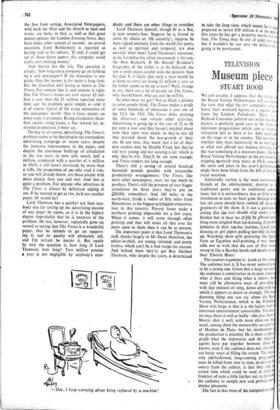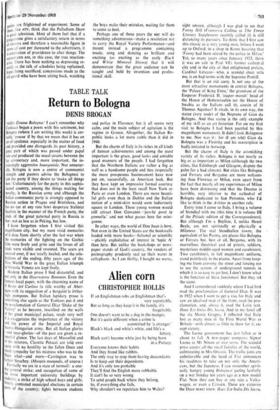Museum piece
TELEVISION STUART HOOD
We can assume, I suppose, that the rating, the Royal Variety Performance will strengthe the view that what the ITV companies need t boost their weekend figures is a regular sho from the London Palladium. There is. Richard Crossman pointed out in his Guildha lecture, a perfectly good case to be made f television programmes which aim at harm relaxation just as there is for their equival on the stage or in the cinema. The question .whether they must necessarily be as unorigin as what was offered last Sunday. evening. Fu this was something of a museum piece. The fir Royal Variety Performance in the presence of reigning monarch took place in .1912; some the turns and jokes in this year's performant might have been lifted from the bill of that lir royal occasion. .
. Admittedly variety is the most conservatn branch of the entertainment, devoted to traditional patter and its traditional come tions; but it is extraordinary that so little of revolution in taste we have gone through in last ten years should have rubbed off on to th producers ,of the show. It is not a question asking that ill-4 cast should strip under a %a blanket but at least we Might 9ffered son thing more original than tap-dancing, gtge, Johnnies in their top hat routines; Czech fol dancing or girl pipers puffing horribly in cl up. Watching show girls posturing like figure from an Egyptian wall-painting, it was imp sible not to wish that the cast of Hair woul sweep in like a Bacchic horde and dazzle us %Ii their `Electric Blues.'
The counter-argument is: Look at the rating The audience love it. It has never seemed to in to be a strong one. Given that a large section o the audience is conservative in its taste, krmin what it likes and liking what it knows, the must still be alternative ways of providing with that mixture of song, dance and mild se which it appears to desire so strongly. The inc damning thing one can say about the Rol Variety Performance, which is the Palladi Show writ large, is that it is the laziest form o television entertainment conceivable. The di for may shoot it well or badly—this year Steoa Morris shot it well, with more close-ups th usual, among them the memorably ravaged fa of Manitas de Plata—but his involvement the production is minimal. He is there to phot graph what the impresario and the theatric agents have .put together between them. H knows, even if the audience does not, that the are better ways of filling the screen. The gas) why old-fashioned, long-running programm must be killed from time to time, in spite of outcry from the addicts, is that they take II screen time which could be used to push lb frontiers of taste a little further out, to person the audience to sample new and perhaps mo intense pleasures.
The fact is that most of the independent co
panics are frightened of experiment. Some of them, like Kw, think that the Palladium Show is good television. Most of them feel that if a programme gives a satisfactory return in terms of viewers and therefore a reasonable figure in terms of cost per thousand to the advertisers, it is temptation of providence to alter things. The accountants are, in this case, the true reaction- aries. There has been nothing so depressing re- cently as the talk of schedules being replanned, hopes being sacrificed, concessions made to the old guard who have been sitting back, watching
the boys make their mistakes, waiting for them to come to heel.
Perhaps one of these years the BBC will do something adventurous—make a resolution not to carry the Royal Variety Performance—and mount instead a programme containing music, song and dancing so brilliant and exciting (as exciting as the early Black and White Minstrel Shows) that it will demonstrate that the great audience can be caught and held by invention and profes- sional skill.







































 Previous page
Previous page